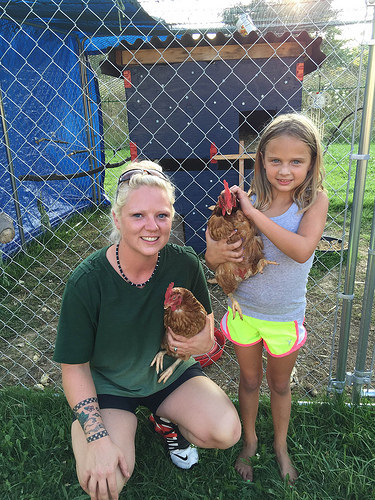Writer / Janet C. Striebel
 As you’ve seen in the grocery store, there are many labels appearing on eggs these days, such as cage-free, free-range and humanely-raised. These alternative methods have come about ever since people started becoming aware of the treatment of egg-laying hens, like how they’re confined to battery cages without room to spread their wings.
As you’ve seen in the grocery store, there are many labels appearing on eggs these days, such as cage-free, free-range and humanely-raised. These alternative methods have come about ever since people started becoming aware of the treatment of egg-laying hens, like how they’re confined to battery cages without room to spread their wings.
According to humanesociety.org, on average, each egg-laying hen is confined to only 67 square inches of cage space, less than the size of a letterhead piece of paper, in which she’s expected to live her whole life. Sadly, caged hens are among the most confined animals in agribusiness and are also denied their most natural behaviors such as perching, nesting and dust bathing.
Some people have decided to raise chickens in their own backyards not only to guarantee healthy eggs but also to feel comfort in knowing they’re helping egg-laying hens lead happier lives.
“One of the biggest misconceptions is that you need a rooster to help a hen lay eggs,” says Sally Summitt, owner of five backyard chickens in a neighborhood near Speedway. “You only need a rooster if you want baby chicks. A hen will automatically lay eggs for food, and each hen will produce about 200-250 eggs per year.”
Sally became interested in raising chickens when she learned about the treatment of chickens and how they can peck themselves to death when living in tight quarters. She is an animal lover as she also grooms dogs in Fishers at Bridgeview Grooming.
“Many may not know that the eggs at the grocery store may be up to six months old,” she says. “I felt that I could do a little bit by having our own fresh eggs and teaching my children that we can feel proud to know we’re allowing chickens to free range and live happier lives.”
Sally pulls the eggs before 6 p.m., rinses them and lays them on the counter. She claims that they’re good for 3-6 weeks without refrigeration. As a test for freshness. she recommends the “float test” where eggs are submerged in water. If the egg floats, then it is bad. If it sinks to the bottom, then it is fresh.
“My hens don’t make much noise except when they are actually laying an egg,” says Sally. “It reminds me of a kitchen timer as if they’re saying, ‘Dinner’s ready!’”
Two of the five hens that Sally owns are Easter Eggers (type of breed) while the other three are Rhode Island Reds and are rescues from a factory. Unfortunately, the three Reds have damaged beaks. She and her daughter, Sophie, take extra care in feeding these three by providing softer foods that don’t require pecking such as corn cut from the cob and scrambled eggs, believe it or not.
Typical hens without injured beaks will eat vegetables, some fruits, layered, crumbled feed and scrambled eggs. Sally says that chickens need some grass for consumption and in order to get the bugs. Also they need some type of grit like oyster shells available all the time to help with digestion.
“The interesting thing to me about raising chickens for eggs is that this is how people did it forever until about 50 years ago,” says Cindy Baney, owner of 30 chickens who lives on the unincorporated east side of Fishers near Fortville. “Most folks had a family garden, and many of our parents grew up with chickens.”
Cindy and her family decided they wanted to get the most out of their nutrition after her husband, Steve Baney, was diagnosed with cancer four years ago.
“We chose to begin living a healthier lifestyle. We began looking at our carbon footprints and decided it was time to quit using pesticides, change our ways and become more connected to health,” she says.
Her 16-year-old daughter, Claire, was the motivating force behind their move from a suburban neighborhood to the 3.6 acre farm. Since Claire was active in FFA and 4H, she urged her parents to move so they could have more animals. Now they not only have chickens, but ducks, goats, sheep and a pig. Incidentally, they also have two roosters, so they are raising chicks as well.
“Raising chickens is easy,” says Cindy who provides her chickens with quality feed from Hoosier Heritage Farm (hoosierheritagefarm.com).
Steve built a chicken coop with perches at various levels where the chickens retire for the night. Like clockwork, they seem to know that it’s bedtime as they waddle into their coop each evening at dusk. The coop is where the hens lay their eggs.
“Our chickens have a great life on a green pasture where they free range,” says Cindy. “They pick out leftover crops from our garden like the tomatoes and help fertilize for our next season.”
Cindy and Steve are both teachers in Hamilton County. Cindy is among one of three teachers out of 30 that raise chickens at Carmel Elementary, where she teaches music.
Another family wanting to raise chickens also lives in the unincorporated Fishers area. “We knew we wanted to raise chickens from the start,” says Shannon Vierling, who owns 12 chickens on four acres near 126th and Cyntheanne. The Vierling family has provided two acres for their chickens to free range.
“I wanted our kids to see the cycle of where our food comes from and how we take care of the animals in order to get our food in return,” she says.
Shannon and her family have raised their chickens from baby chicks and are now reaping the rewards of healthy eggs. She appreciates how Tractor Supply Co. in Noblesville provides the starter kits for raising chickens (tractorsupply.com).
“The chickens are more social and interactive than we thought,” says Shannon. “They are pet-like and follow our son, Luke, around the yard. When he sits upon the swing, the chickens will jump up and sit next to him,” she adds with a laugh.
When asked if she thinks it has been worth it to raise chickens so far, she has no doubt.
“The kids get so excited to bring me the eggs from the coop. It means so much more to them than going to Kroger and grabbing a carton from the shelf…Also they benefit from seeing the care we put into the animals and what we get back in return,” she says.
If you’re interested in raising chickens, check first with your homeowners association and/or your residential regulations and ordinances for raising livestock. Go to backyardchickens.com for more information. This website is helpful to guide beginners on everything from inquiring your local laws to designing your personalized chicken coop.






